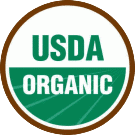Order products!
About our farm
Farm blog
Why grass fed?
Why organic?
Why soy-free?
Why eat local?
Our difference
FAQ's
Bone broth
Organic chicken
Organic eggs
Organic pork
Frozen is Fresher
Testimonials
Recipes
Contact us

From our family to yours...
We are a 100%-owned family farm, so you can rest assured that everything that bears our name is produced on our farm with the greatest attention to every detail.
You see, we truly care about the health of our family, and we care about yours too.
Our mission is to provide families with truly healthy meat.

Farm Blog
Posted by: Trevor
August 21, 2013
First, the good news. Our cattle herd has never been happier, grazing on mountain pastures and enjoying the warm weather, living the way they were designed to. We're so grateful for our customers, whose support we treasure, and who willingly take the time and effort to buy directly from us. We're so encouraged. Several of our breeding cows have recently calved, and there are some really gorgeous babies running around. Here's one of them:

This is one of our new additions, with his mom
While it's wonderful that our cows can live this way, the fact is that most beef cows in North America don't have it nearly so good. And as if consumers didn't already have enough reasons to reject conventional beef and buy grass-only organic, here is another which you may not be aware of:
The conventional beef supply in North America is not only laced with steroids and antibiotics, but now it turns out the feedlots have added a new drug --- Zilmax --- which is making the cattle grow even faster, although at a sickening cost.
According to the Wall Street Journal ("What's Ailing America's Cattle?" Aug/2013) beef producers have been feeding their cattle beta-agonist drugs including Zilmax in an effort to boost rapid weight-gain, yet the pharmaceuticals are resulting in difficulty walking and moving as the cows near slaughter. Some "simply lay down, their tongues hanging from their mouths. A few even sat down in strange positions, looking more like dogs than cows ."
The drug manufacturer, Merck, says it will temporarily suspend sales of Zilmax, although it would be naive for consumers to think the problem is going away. Other beta-agonists continue to get pumped into the food supply. According to the Journal, "beta-agonists are mixed into cattle feed during the final weeks before slaughter to promote weight gain by stimulating the growth of lean muscle instead of fat.
They aren't hormones, but Zilmax, or zilpaterol, can add roughly 2% or 24 to 33 pounds to an animal's final weight. Its rival, ractopamine-based Optaflexx, can add as much as 20 pounds. The Journal goes on to say that 70% of the cattle being slaughtered in the US are being fed these drugs.
It's not just in the US --- the drugs are being used in Canadian livestock production too.
Technically, beef and pork producers could legitimately sell their product as "hormone free" at a premium price, yet still be dosing their animals with beta-agonists. They're not hormones, after all. Remember that the next time you see supermarket or restaurant meat labeled "hormone free" --- unless it's certified organic, it may have non-hormone pharmaceuticals in it.
According to one cattle producer interviewed in the article "...you only have so many days after an animal has been fed [a beta-agonist] before it's got to go to slaughter or it becomes so lame it can't move".
Another beta-agonist, ractopamine, is also widely used in livestock production, including pork. Apparently consumers in North America don't mind eating pork laced with ractopamine, however the rest of the world, including China, have prohibitions against it. Russia and the European Union won't accept it either. It seems that North American consumers don't seem to care that much, just as long as their food is tasty and cheap.
While it's true that pharmaceutically-enhanced meat is cheap at Costco, the hidden costs to the health of humans, the animals and the planet are very real, although difficult to measure. This applies not just to drugged animals, but also to GMO crops, CAFO's, Roundup, and industrial farming in general.
In response, consumers say things like:
"Well, can you prove that drugging the livestock will make people sick?"
"Can you prove that GMO food will make me and my descendants sterile?"
"Can you prove that animals raised in confinement aren't happy?"
"Can you prove that Roundup residue in the groundwater and my urine is bad?"
I've sometimes had discussions like this with people and have come to the conclusion that they're not meant as real questions, but rather excuses. Of course we can prove that industrial farming and all its collateral synthetic inputs are damaging to humans, animals, and the ecology, but do we need studies to tell us what should be obvious?
And here's something else. Many of the farmers who run industrial farms regret their production techniques yet they continue operating this way because they are locked into a model which dictates their pricing. Their output is considered a commodity, and is priced to reflect international competitiveness, against foreign competitors who care very little about future generations.
Which is another reason why I urge consumers to buy their food directly from local farmers who they know and trust. By talking to your farmer you'll find out how your food is really produced, and you'll have a say in it. This results in a more resilient and healthy system, all around.
Yes, it's less convenient than going to the supermarket, and probably not as cheap. But if you can purchase your meat, eggs and fresh produce this way, the positive impact you can have on the health of your family, your community and the planet is substantial.
Other Farm Blog Posts



